THE CONSEQUENCES OF IMPERIALISM
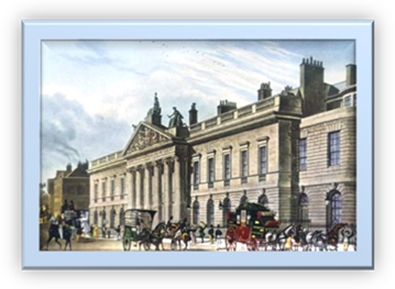
British East India Headquarters in London
Unit
Overview
As
European nations and the United States advanced their quest for territory,
millions of people found their traditional way of life threatened by foreign
influences. The colonized soon realized
that their traditions and beliefs were challenged by a Western culture that was
firmly believed in its own superiority.
Chinese, Africans and Indians reacted to this attitude in several ways
with mixed results. Let’s see how it all
happened.
STOP: Answer Section A Questions
Critics
of Imperialism
To
most Europeans and Americans, it seemed logical that Westerners should carry
civilization and progress to more primitive countries. Non-whites would receive the benefits of
better medicine, a higher standard of living and improved infrastructure. This would
prepare them for democracy and self-government.
Peace and stability would lead to the acceptance of Christianity. This
thought pattern seemed reasonable, but it actually fit the description of a logical fallacy. It overlooked the fact that the colonized already had well-established
and complex cultures based on deeply rooted traditions. The European model of progress was also
destructive to local communities and the environment.
The
power and arrogance demonstrated by the colonizers
did have some critics in the United States and Europe. Reformers such as J.A. Hobson often saw imperialism as part of a double
standard. Nations who had fought hard
for democratic principles and civil liberties were ruling vast areas as
dictators. The ideals of representative
democracy were ignored as the West continued to manage lands in Asia, India and
Africa. Authors of fiction and
non-fiction works also responded. For
example, Joseph Conrad traveled to
Africa as a naval officer and wrote a series of magazine articles. These became the basis for his novel titled Heart of Darkness published in
1902. It tells the story of a British
citizen who fulfilled his desire for adventure when he took a position on a
steamship operated by a company searching for African ivory. Conrad included his eye-witness observations
of the cruel treatment of African natives.
The majority of Europeans, however, continued to believe that the
inhabitants of their colonies welcomed their presence and benefitted from
it. The natives of Africa, India and
China, however, viewed this from a different perspective.
STOP: Answer Section B Questions
The
African Reaction to Imperialism
Given
the sheer size of the continent, it was not surprising that the African
reaction to nineteenth century colonialism varied. Civil wars and the ill-effects of the slave trade
had so devastated some areas of Africa that the Europeans were welcomed. Africans living here hoped that the outsiders
would end the violence and turmoil.
Other sections of the continent attempted to resist but soon discovered
that they were no match for the well-equipped armies of Europe. Yet, not every conquest was easy. There were exceptions to the quick
acquisition of land by Great Britain and the other Western powers. Ethiopia,
for example, had a geographic advantage thanks to mountains along its
borders. The country also had a capable
leader named Menelik II. He knew how to use rivalries to his
advantage. Great Britain, Italy and
France were each determined to control this part of Africa. Therefore, Menelik II was able to defeat an
Italians when they tried to take over his country. After Italy lost the Battle of Adowa to the Ethiopians in 1896, Menelik II even managed
to extend his empire. Addis Ababa, the capital city of
Ethiopia, reflected Menelik’s interest in Western technology and featured new
schools, hotels and hospitals.
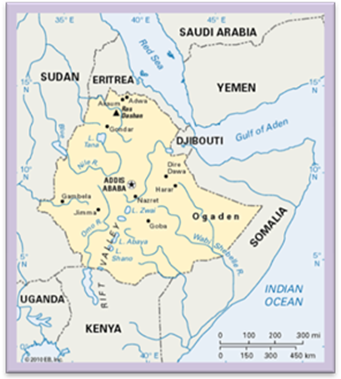
Map of
Ethiopia
Although
a number of Europeans resided in Algeria and South Africa, relatively few
Westerners desired to live in Africa.
Instead, the colonial powers governed their territories indirectly. Treaties were negotiated with local rulers
already in power, but this did not mean that life remained the same for most
Africans. The nations of Europe wanted
to take advantage of the natural resources their colonies had to offer. To do this, they needed African labor. At first, natives were simply forced to work
in the mines and on the plantations, but taxes
soon proved to be a more valuable weapon.
Most Africans had always paid taxes in the form of goods or
services. Those who worked for foreign
investors were paid wages and were forced to pay their taxes in money. The tax money was used to provide services
such as improved farming methods and healthcare, but these improvements
actually benefitted businessmen more than Africans. Even though the British had outlawed slavery
within their empire in 1833, military campaigns such as the Boer War were
fought at the expense of the African people and created a lifestyle similar to
that of a slave.

It
became apparent that Africans had become second-class citizens in their own
land. Since resistance to the foreign
onslaught proved ineffective, some Africans attempted to adopt Western culture
as a means to regain power over their territories. To maintain authority over their colonized
lands, Europeans supported only minimal education for native Africans. Fearful that too much knowledge might lead to
a loss of control over their dominions, Europeans moved Asians and Indians into
Africa for those jobs which required special skills. The native work force was reserved for
unskilled labor. Missionaries worked to spread Christianity throughout Africa, but
the priorities for the ruling nations were simply to maintain order and to make
a profit. Although they did not advocate
a complete change in government, Africans educated in the Christian mission
schools of South Africa began to push for equal treatment. In 1912, the African National Congress was formed with the purpose of
establishing political rights and individual liberty for the native population.
STOP: Answer Section C Questions
The
Chinese Reaction to Imperialism
Although
China escaped having its lands divided into colonies, foreign influence
dominated economic and political life within the country’s borders. Unfortunately for the Chinese, the corrupt
and nearly bankrupt government was unable to deal with the expanding population
and the effects of unequal treaties. For
many, a change in government seemed the best way to restore China to her former
greatness. Hong Xiuquan, a leader of a small village in southern China,
believed this was his mission. With a
peasant army of one million followers known as Taipings, he began a rebellion in 1853. After the rebels took control of the local
region, the British government became alarmed and decided to protect their
economic investment in China. Great
Britain sent troops to assist the Chinese government in ending the Taiping Rebellion.
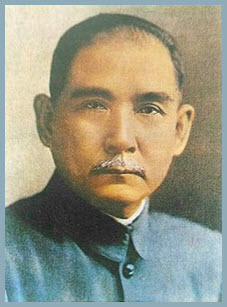
Sun Yat-sen
Although
the rebellion was unsuccessful, most Chinese now realized that some kind of
change was necessary. However, opinions
were sharply divided in terms of how to approach the future. The revolt convinced many Chinese that
modernization was crucial to the country’s independence, peace and
security. The young Emperor Guangxu agreed with this viewpoint and favored a new
approach. There was serious opposition
to this policy from those who favored a return to traditional Chinese values
and culture including his aunt, Empress Cixi. She was a powerful and charismatic woman who
drew enough political support to have her nephew imprisoned. Organizations dedicated to removing foreign
influences from China began to grow in membership. The most famous of these groups was the
Society of the Righteous and Harmonious Fists or the Boxers.
The
Boxers adopted the slogan, “Death to the foreign devils,” and spearheaded a
rebellion in 1900. The violence
escalated and threatened European businessmen as well as Christian missionaries. The Chinese government, controlled by Empress
Cixi, secretly supported this movement.
Driven by economic concerns, Western nations quickly formed the Eight Power Expedition consisting of
soldiers from Russia, Austria-Hungary, Great Britain, Germany, France, Japan,
and the United States. This combined
effort ended the Boxer Rebellion and
resulted in the Treaty of Peking
(Beijing), another humiliating agreement for China. Although the Boxer Rebellion was not a
military success, it reinforced China’s growing anti-foreign sentiment.
The
next revolution, led by Sun Yat-sen,
was successful in overthrowing the government, and China became a republic in
1911. Sun Yat-sen hoped to combine
Western ideas and traditional Chinese values into a guiding policy for a strong
nation. He proposed to end Western
domination of trade, to reform the economy and to establish an open
relationship between the people and the government. These were worthy goals, but they would prove
difficult to accomplish.
STOP: Answer Section D Questions
The
Indian Response
Unlike
Asia and Africa, India experienced an extensive European presence long before
the nineteenth century. In 1599, eighty
London merchants formed the British East
India Company. They established their first trading station
in India at Surat in 1612 and quickly added more ports. The company also became involved in Indian
internal affairs and supported those rulers who did not oppose their
activities. The Industrial Revolution rapidly increased Great Britain’s need for
raw cotton to fuel its growing textile
industry. In spite of the necessity of
feeding the growing population of India, farms were converted into plantations
to grow cash crops such as tea. This decreased the country’s food
supply. The island of Ceylon, which today is known as the
nation of Sri Lanka, saw its
tropical forests destroyed for the purpose of clearing land in order to plant
commercial crops for export. The British
East India Company’s power and profits skyrocketed; unfortunately, the
company’s corruption and mismanagement also increased. At the same time, Indians began to resent
their authority.
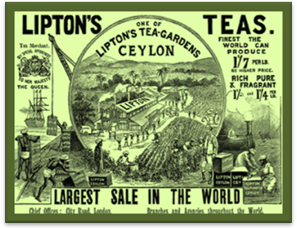
The
British East India Company struggled to maintain control of India and recruited
an army of natives referred to as sepoys
to assist with this task. In 1857, the
British supplied these troops with ammunition and weapons. The cartridges were sealed with either beef
or pork fat. To use them, soldiers had
to bite off the seal. The British
military never questioned this aspect of their duty, but Indian soldiers were
highly offended by this practice. Those
who followed the Hindu faith did not eat beef; those who followed the Muslim
faith did not eat pork. For some native Indians this proved to be the last
straw. It resulted in what the British
called the Sepoy Mutiny which was
actually a full-scale revolt. The East
India Company requested military assistance from the British government, and it
took over a year to restore order. Since
Great Britain did not want its supply of raw materials disrupted, the
government began to rule India directly through a Cabinet post in London and a
British official called a viceroy in
India.
The
British believed they knew what was best for the Indian people and embarked on
an ambitious program for improvement.
They built railroads and telegraph lines. The Indians provided the labor and the
funding through taxes, but British engineers directed the work. The lives of the poor in India improved very
little, and educated Indians resented their status as second-class
citizens. In spite of their knowledge
and skill, the best jobs, highest salaries and finest houses were reserved for
British citizens living in India. This
form of racial discrimination caused
injured pride and frustration. Many
native Indians believed that the best way to achieve greater equality and
self-government was through the political process. This led to the formation of a political
party called the Indian National
Congress which met for the first time in 1885. The Congress eventually became a powerful
organization that pulled together millions of people working for reform and
greater individual liberties.
STOP: Answer Section E Questions
What
Does It All Mean?
The
colonized and the colonizer viewed the same series of events from totally
different perspectives. For the
colonizers, the profits that they earned seemed fair. They took great pride installing modern
transportation, communication and transportation systems. The foreigners introduced new agricultural
techniques, built hospitals and established schools. In some cases, orderly governments were
established, and civil wars stopped.
From the colonizer’s point of view, they had earned the gratitude and
respect of the people that they controlled.
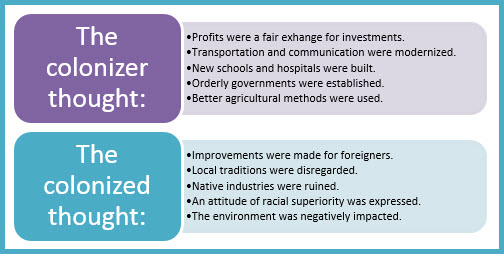
To
the colonized, however, these changes seemed more of a threat than a
benefit. From their perspective, most of
the improvements were provided for the convenience of foreigners or to increase
profits. Native people already had
traditions, customs and religions that they did not wish to disregard. Local communities and economies were often
based on native handicraft industries that disappeared under imperialism. The attitude of racial and social superiority
created feelings of distrust and resentment that were never resolved. The loss of forest areas and alterations to
the landscape impacted the environment in negative ways. Would the industrialized nations of the world
assume responsibility for the negative aspects of colonialism? Would the relationship between the colonized
and the colonizer led to cooperation or conflict? We are still struggling with these questions
today.
Additional Resources and Activities

What Was the Boxer
Rebellion? Article with Quiz
The East India Tea Company: The Company that once Ruled India Article
with Quiz